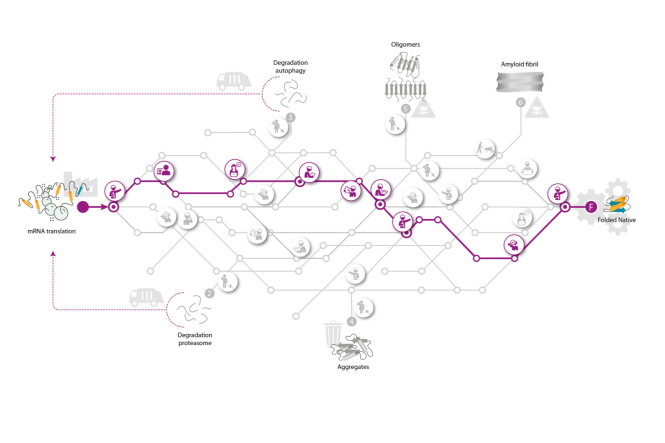FLOW
Health is not a given as it often is challenged by the body’s own proteins. To prevent harm, cells have a vast quality-control system in place that supports, corrects or removes damaging proteins. Failure of this quality-control system results in diseases including Alzheimer’s, Parkinson’s, cystic fibrosis, haemophilia and some emphysemas. The consortium of researchers involved in FLOW will, for the first time, comprehensively chart the supervision of specific proteins within the cell, from cradle to grave. Ultimately, leveraging this understanding, they aim to exert control over the fate of these proteins. Such insights could pave the way for novel therapeutic approaches targeting diseases like Parkinson's and cystic fibrosis. From Leiden, Alfred Vertegaal (LUMC) is one of the consortium leaders. Monique Mulder (LUMC) and Anne Wentink (LIC) are also involved in the consortium. Other researchers involved in this consortium are from Utrecht University, the University of Twente and UMC Groningen.
Institute for Chemical Neuroscience (iCNS)
The aim of iCNS is to elucidate the molecular changes relating to psychiatric symptoms such as depression, anxiety and psychosis. Neurobiologists, chemists, psychiatrists and data science experts are working closely together on human brain tissue. Young scientists will be trained in combining chemistry, artificial intelligence and neurobiology. Their research will lead to a ‘brain atlas’ of psychiatric symptoms and to entirely new approaches to improve the diagnosis, prognosis and treatment of psychiatric illnesses. Ten Leiden researchers are involved in the consortium. Professor Mario van der Stelt (LIC) has a leading role and the following are also involved: Kim Bonger (LIC), Elise Dusseldorp (Psychology), Stephan Hacker (LIC), Anthe Janssen (LIC), Sander van Kasteren (LIC), Alexander Kros (LIC), Ahmed Mahfouz (LUMC), Monique Mulder (LUMC), Martijn Verdoes (LUMC) and Gerard van Westen (LACDR). Other researchers involved in this consortium are from the University of Amsterdam, UMC Groningen, Radboud UMC and Utrecht University.
Read more: Millions in subsidies for 'brain atlas' - University of Amsterdam (uva.nl)
